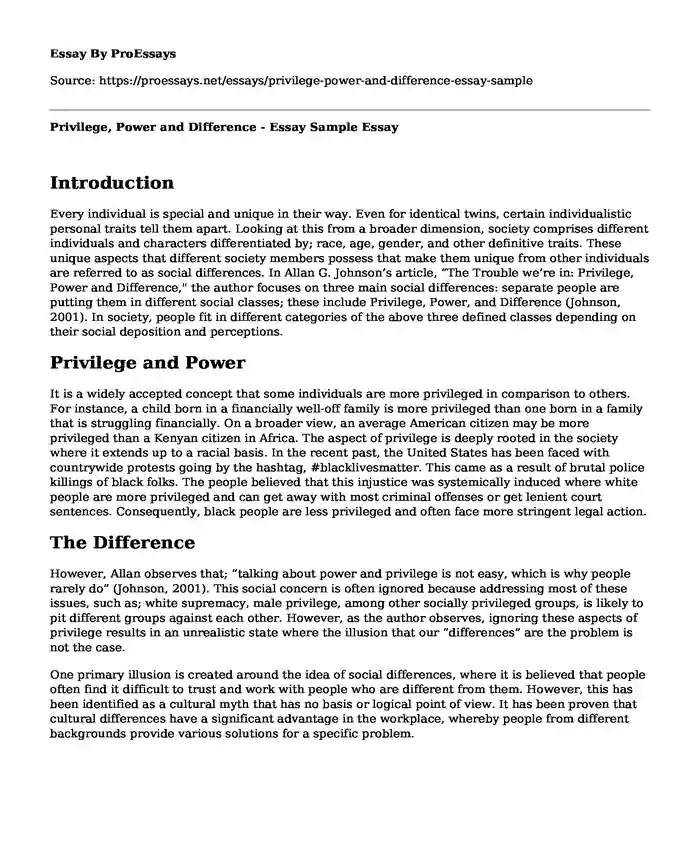Introduction
Every individual is special and unique in their way. Even for identical twins, certain individualistic personal traits tell them apart. Looking at this from a broader dimension, society comprises different individuals and characters differentiated by; race, age, gender, and other definitive traits. These unique aspects that different society members possess that make them unique from other individuals are referred to as social differences. In Allan G. Johnson’s article, “The Trouble we’re in: Privilege, Power and Difference," the author focuses on three main social differences: separate people are putting them in different social classes; these include Privilege, Power, and Difference (Johnson, 2001). In society, people fit in different categories of the above three defined classes depending on their social deposition and perceptions.
Privilege and Power
It is a widely accepted concept that some individuals are more privileged in comparison to others. For instance, a child born in a financially well-off family is more privileged than one born in a family that is struggling financially. On a broader view, an average American citizen may be more privileged than a Kenyan citizen in Africa. The aspect of privilege is deeply rooted in the society where it extends up to a racial basis. In the recent past, the United States has been faced with countrywide protests going by the hashtag, #blacklivesmatter. This came as a result of brutal police killings of black folks. The people believed that this injustice was systemically induced where white people are more privileged and can get away with most criminal offenses or get lenient court sentences. Consequently, black people are less privileged and often face more stringent legal action.
The Difference
However, Allan observes that; “talking about power and privilege is not easy, which is why people rarely do” (Johnson, 2001). This social concern is often ignored because addressing most of these issues, such as; white supremacy, male privilege, among other socially privileged groups, is likely to pit different groups against each other. However, as the author observes, ignoring these aspects of privilege results in an unrealistic state where the illusion that our “differences” are the problem is not the case.
One primary illusion is created around the idea of social differences, where it is believed that people often find it difficult to trust and work with people who are different from them. However, this has been identified as a cultural myth that has no basis or logical point of view. It has been proven that cultural differences have a significant advantage in the workplace, whereby people from different backgrounds provide various solutions for a specific problem.
Oppression
The society’s failure to address the development of a sustainable solution for power and privilege ails it, and there is an associated flip side. For certain society members to enjoy the power and privileges they do, somebody else has to pay the price. This is where oppression sets in, given that for others to enjoy the various powers and privileges, work has to be put in. A clear example of such an instance is slavery, where farm owners were the beneficiaries of the free labor that the slaves provided. The slave owners had both power and privilege due to their racial status. Therefore, they were considered to be more superior compared to the black slaves who were considered racially inferior.
The Social Construct of Difference
James Baldwin, a gay African-American writer, observes that most of what is considered "real" is nothing short of cultural creations (Baldwin, 1989). This, therefore, means that most of this information is only made up but is not necessarily true. For instance, according to Baldwin, he appreciates the existence of skin color differences. However, he observes that unless a person lives in a society where these differences are known and considered significant, n a different setting, these differences could be insignificant and irrelevant, therefore non-existent.
Conclusion
Clear reading and analysis of Allan G. Johnson’s article, “The Trouble we’re in: Privilege, Power and Difference," indicates that most of the social challenges we experience are socially engineered and get enhanced further through our perceptions through the society around us. To overcome these challenges, society has a collective responsibility to develop new and more effective social structural systems that can help eradicate some of the existent misleading social differences. This will help develop new social perceptions and mindsets that will facilitate better and improved interactions devoid of divisive social differences. Based on the research presented, some of the social challenges have been created from cultural beliefs that are misinformed. To correct and make the situation right, these misinformed cultural beliefs need to be discarded to pave way for the implementation of rational and logical social interaction cues which will help address some if not all of the prevailing social challenges.
References
Baldwin, J. (1989). Conversations with James Baldwin. Univ. Press of Mississippi.
Johnson, A. G. (2001). The trouble we're in: Privilege, power, and difference. Privilege, power, and difference 15-41.
Cite this page
Privilege, Power and Difference - Essay Sample. (2023, Dec 12). Retrieved from https://proessays.net/essays/privilege-power-and-difference-essay-sample
If you are the original author of this essay and no longer wish to have it published on the ProEssays website, please click below to request its removal:
- Video About the Issue of Human Trafficking
- Research Paper on Physical Child Abuse
- Essay on Drug Arrests: Uncovering Racial Disparities and Strategies to Minimize Inequities
- Literary Analysis Essay on Lysistrata
- Gender Wage Inequality: Impact on Future Economy - Essay Sample
- Drug Use: Impact on Individuals & Society - Essay Sample
- Essay Example on Legislative Action on Prostitution: Europe vs. Thailand







